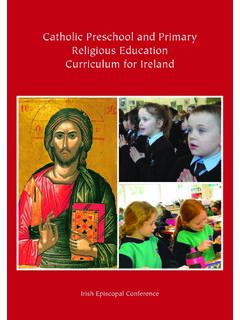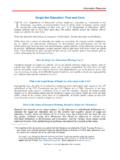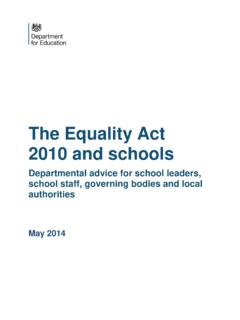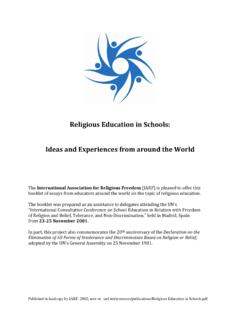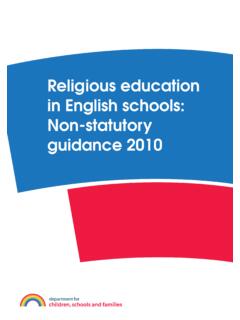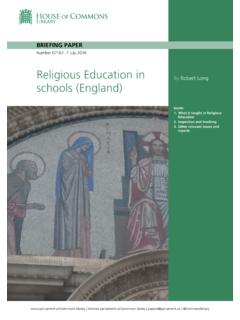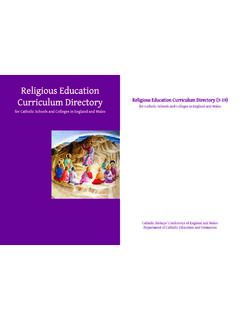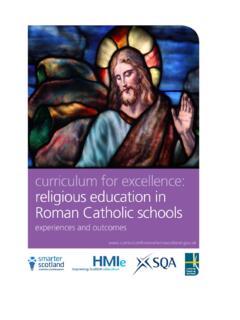Transcription of Norfolk Religious Education Agreed Syllabus 2019 - Schools
1 Norfolk SACREA Religious Education for the FutureUnderstanding religion and worldviews for a life in a changing worldNorfolk Agreed Syllabus 20192 Table of contentsForeword by the Chair of SACRE and the Agreed Syllabus Conference ..3 Introduction ..4 The Purpose of RE .. 4 Aims ..5 Statutory Requirements for the Provision of RE .. 6 The Rationale for the Norfolk Agreed Syllabus .. 9 How do we understand RE as a multi-disciplinary subject? ..10 What do we mean by the disciplines of theology, philosophy and the human/social sciences? ..11 Which religions and worldviews do we need to study in each Key Stage? ..15RE in Early Years Foundation Stage ..17 Designing a progressive, coherent and balanced curriculum for Key Stages 1, 2 and 3 ..18 Suggested Core Questions ..19 Core Knowledge Summary Tables ..23 Buddhism ..24 Christianity.
2 25 Hinduism ..26 Humanism ..27 Islam ..28 Judaism ..29 Sikkhism ..30RE for students aged 14 19 ..31 Attainment and Progress in RE ..32 Teaching and Learning in RE ..33 Appendix 1: Exemplar Curriculum Map for KS1 3 ..35 Appendix 2: Non- Statutory age-related expectations showing examples for Key Stage 1-3 ..37 Appendix 3: Glossary ..40 Appendix 4: RE for pupils with special educational needs and disabilities (SEND) ..41 Acknowledgments ..423 Foreword by the Chair of SACRE and the Agreed Syllabus ConferenceI am delighted to be able to introduce the new Norfolk Agreed Syllabus for Religious Education , which becomes statutory for all maintained Schools in Norfolk from September 2019. This new Syllabus brings fresh and innovative thinking to the study of Religious Education (RE) in Norfolk Schools .
3 It is rooted in a vision for the subject which acknowledges the importance of Religious and non- Religious worldviews in all human life. As The Revd Dr John Hall maintains in his Foreword to the Commission on RE Report (2018): RE is an essential area of study if pupils are to be well prepared for life in a world where controversy over such matters is pervasive and where people lack the knowledge to make their own informed decisions. It is a subject for all pupils, whatever their own family background and personal beliefs and Syllabus captures this vision and develops a curriculum with Religious literacy at its heart. It is a Syllabus which promotes a disciplinary-orientated academic study of religion and worldviews, and thus supports pupils balanced understanding of the world in which they live. This newdisciplinary approach is rooted in the work of Dr Kathryn Wright (Independent RE Consultant) who has worked with a number of other advisers including, Mrs Jane Chipperton, Mrs Kate Christopher, Mrs Gillian Georgiou, Dr Richard Kueh and Mrs Olivia Seymour.
4 The formation of this Agreed Syllabus has also been supported by Mrs Kate Agreed Syllabus is a significant departure from that of 2005 and 2012. It establishes RE as a multi-disciplinary subject for the first would like to pay tribute to the hard work of all those involved and commend this Syllabus to OldfieldChair of SACRE and the Agreed Syllabus ConferenceDate TBC4 Introduction The Norfolk Agreed Syllabus 2019 charts a new way forward for RE, placing the subject within strong academic disciplinary traditions. This Syllabus builds on the enquiry-based pedagogy advocated in 2012 but aims to raise expectations of both teachers and pupils in terms of the scholarly study of religion and worldviews. This Syllabus is part of an ongoing discourse within the RE community1 and provides a framework for continued discussion as teachers build their curriculum around this new school s RE curriculum should be set within the broader intent of the whole school curriculum.
5 This Syllabus is designed to support school leaders by clearly stating the intent, appropriate implementation and potential impact of RE on the lives of children and young people so that they can flourish in a changing Purpose of REPurpose of Study statementHigh-quality RE will support pupils Religious literacy. In the context of this Syllabus , being religiously literate means that pupils will have the ability to hold balanced and well-informed conversations about religion and Pupils will be able to make sense of religion and worldviews around them and begin to understand the complex world in which they live. RE is primarily about enabling pupils to become free thinking, critical participants of public discourse, who can make academically informed judgements about important matters of religion and belief which shape the global For example, Kueh, R.
6 , 2018. Religious Education and the Knowledge-Problem . In: Castelli, M., and Chater, M., eds., We Need to Talk about Religious Education . London: Jessica Kingsley. 70. In addition, Kueh, R. (2019) A Matter of Discipline? On knowledge, curriculum and the disciplinary in RE (Professional Reflection, REToday, September 2019). also see Myatt, M., 2018. The Curriculum: Gallimaufry to coherence. Woodbridge: John Catt Educational and The Commission on RE Report 2018, This Syllabus is rooted in the thinking of Dr Kathryn Wright, Mrs Jane Chipperton, Mrs Gillian Georgiou, Dr Richard Kueh and Mrs Olivia Seymour. The intellectual property of this multi-disciplinary approach sits with these advisers and not with Norfolk County Chipperton, J., Georgiou, G., Seymour, O., and Wright, K., 2016.
7 Revision Rethinking RE: A conversation about Religious and theological literacy. (2016). REMatters Blog. [Blog] Available at: 4 To know about and understand a range of Religious and non- Religious worldviews by learning to see these through theological, philosophical and human/social science lenses. To express ideas and insights about the nature, significance and impact of Religious and non- Religious worldviews through a multi-disciplinary approach. To gain and deploy skills rooted in theology, philosophy and the human/social sciences engaging critically with Religious and non-reliigous progress is assessed in relation to the purpose and aims of the subject. Therefore, this primarily concerns how well pupils are able to hold balanced and well-informed conversations about religion and worldviews.
8 In other words, are pupils becoming more religiously literate? Attainment and progress are therefore linked to the multi-disciplinary approach to RE advocated throughout this Syllabus . This Syllabus acknowledges recommendations for curriculum design in the Commission on RE Report (2018). Whilst the suggested National Entitlement contained in the report6 is not a foundational principle for the Syllabus outlined here, there is synergy between what is proposed and the focus on the different ways in which religion and worldviews can be understood, interpreted and studied, including through a wide range of academic disciplines and through direct encounter and discussion with individuals and communities who hold these worldviews. 75 These aims are based on those found in The Non-Statutory National Framework for RE (2013)6 Commission on RE Report 137 Commission on RE Report Requirements for the Provision of REThe primary legislation passed with regard to RE between 1944 and 1993 was consolidated by The Education Act (1996) and the school Standards and Framework Act (1998).
9 Circular 1/94 and the subsequent revision of this guidance in 2010 ( Religious Education in English Schools : Non-Statutory Guidance 2010) offered an interpretation of the legislation. The legal requirements are: 1 . RE must be provided for all registered pupils in full time Education except those withdrawn at their parents request. [S352 (1) (a)] The law relating to RE for pupils who are not yet in Key Stage One is different from that relating to subjects of the National Curriculum. As RE must be taught to all registered pupils at the school , it includes pupils in reception classes, but not those in nursery classes or play groups. By the same law, RE must be provided for all students in school sixth forms (but not those in Sixth Form Colleges, which must provide RE for all students wishing to receive it). Special Schools must comply with this requirement by ensuring that every pupil receives RE as far as is RE must be taught in accordance with an Agreed Syllabus in Community Schools , Foundation Schools and Voluntary Controlled Schools .
10 However, in Foundation and Voluntary Controlled Schools with a Religious foundation, parents may request RE in accordance with the school s trust deed, or in accordance with the beliefs or denomination specified in the designation of the In Voluntary Aided Schools with a Religious character, RE is taught in accordance with the Trust Deed, or with the beliefs or denomination specified in the designation of the school , to reflect the Religious character of the foundation. A governing body may accept a recommendation from their Diocese to adopt the Locally Agreed Technology Colleges, Academies and Free Schools are independent Schools ; however, as a condition of grant funding, they are required to make provision for denominational Academies with a Religious character (Church of England or Roman Catholic, but also Muslim and most Jewish academies), the RE curriculum will be in line with the denominational Syllabus .
